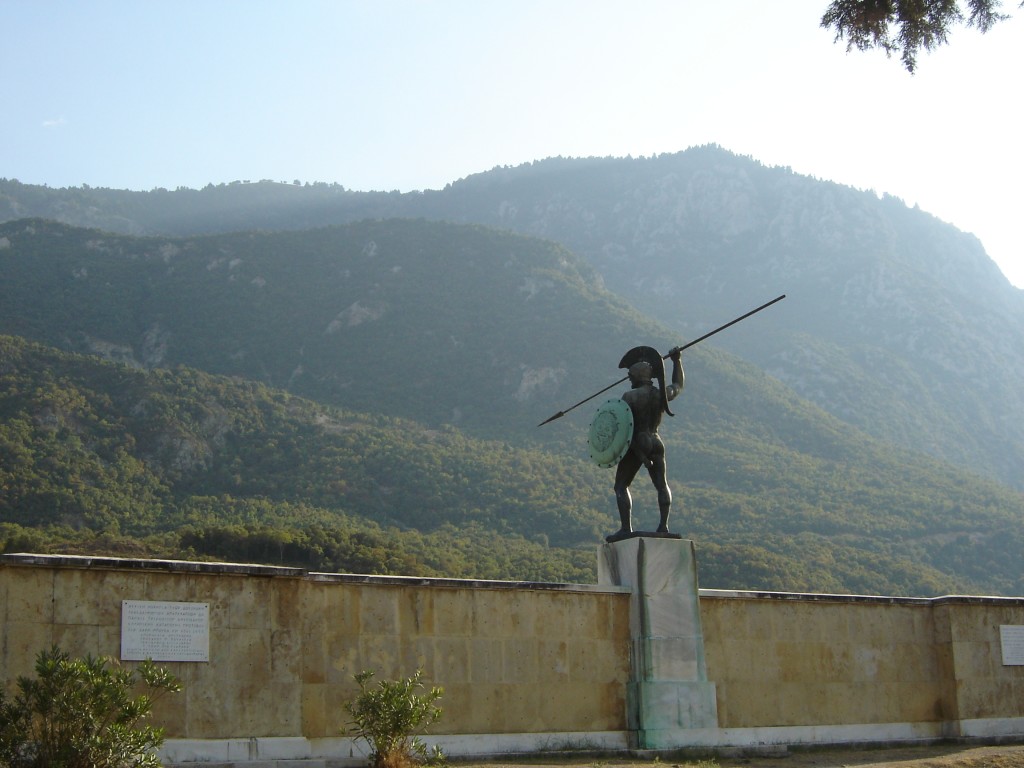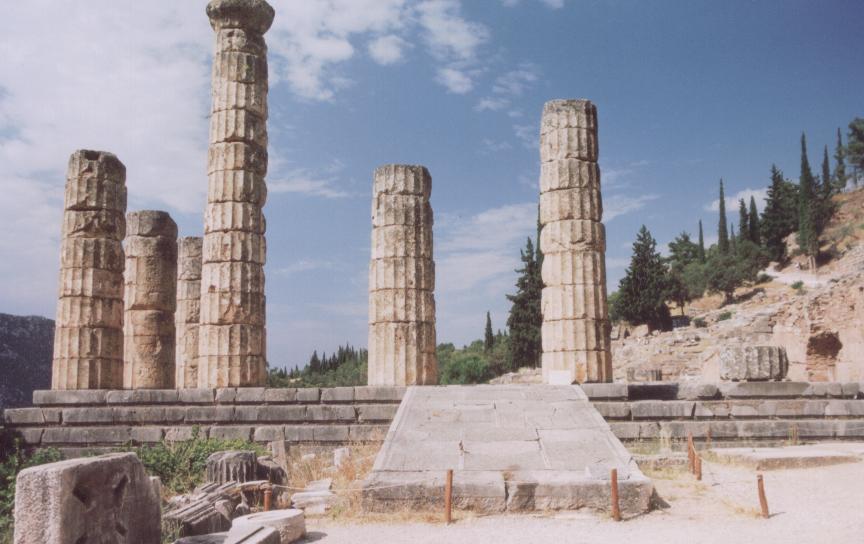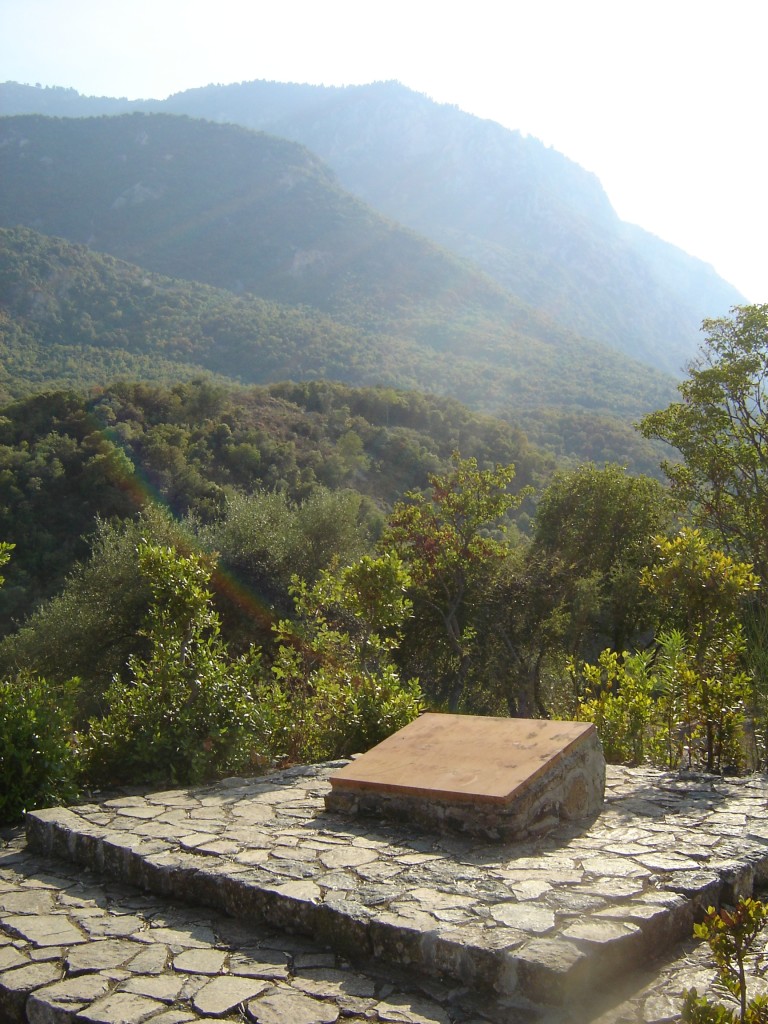Hear your fate, O dwellers in Sparta of the wide spaces;
Either your famed, great town must be sacked by Perseus’ sons,
Or, if that be not, the whole land of Lacedaemon
Shall mourn the death of a king of the house of Heracles,
For not the strength of lions or of bulls shall hold him,
Strength against strength; for he has the power of Zeus,
And will not be checked till one of these two he has consumed.

The Pass at Thermopylae
Thus spake the the Oracle at Delphi, long ago, as recorded by Herodotus, the ‘father of history’, in Book 7 of The Histories. This was the prophecy that was given prior to the Greek stand at Thermopylae in which 300 Spartans and 700 men of Thespiae made one of the most heroic stands in the history of the world. Roughly one thousand Greek hoplites defended the pass known as the ‘hot gates’ (photo above) for three days against an army of about 1 million under Xerxes of Persia. This is a deed of heroism by which all others have been measured in western history ever since, and it echoes across the ages, unspoilt, radiant, despite politics and the greed of much lesser men.
Why is it that this single event in western history is revisited again and again? What do we get out of it today when our lives are so very different from those of 480 B.C.? There are probably several answers to that question, but for myself, it’s summed up in one word: Inspiration.
I know, “there he goes again, on about inspiration. Totally corny.”
Not to me. Inspiration, whether conscious or unconscious, is highly individualistic. I’ve stood on the battlefield of Thermopylae, and though there is a motorway running through it, and the sea has silted up for kilometers, the place casts a spell. It’s not the impressive modern monument to Leonidas of Sparta and his men that I find moving, but rather the little hillock on the other side of the road where the Spartans made their last stand, where they died for what they believed in, for their way of life.

Temple of Apollo at Delphi, home of the Oracle
It’s difficult for the modern mind to grasp this concept, no doubt, and out of misunderstanding, or perhaps fear, many might dismiss this as something that happened long ago. These men and their king volunteered for death, and they shall never be forgotten. They lived strongly, true to themselves. They’ve been celebrated through history to the modern age. Artists, filmmakers and yes, writers, have paid their tributes.
I remember seeing a picture of American troops in Afghanistan, sitting in the sand reading copies of Gates of Fire by Steven Pressfield (sadly, I couldn’t find the picture again to share with you). I think of what reading that book must have done for their morale; I can only guess, but I suspect that it inspired in them something of a will to fight on and face their fears. This is completely separate from the politics around our sad and current state of war and the reasons for it. There are few Leonidas’ in history.
I know I’ve written about this before, but Thermopylae has come to mind again as I’m reading a wonderful book by historian Michael Scott, entitled From Democrats to Kings: The Brutal Dawn of a New World from the Downfall of Athens to the Rise of Alexander the Great.
Scott’s book brings the world of ancient Greece after the Peloponnesian War into stark contrast with those days of honour and glory during the Persian invasion of Greece. It never ceases to blow my mind that a society (or polis, people, cultural group etc.) can achieve such magnificent glories, pleasing to the gods themselves, and then proceed with ease to piss it all away.
The make matters worse, Athens, Sparta, and Thebes each in their own turn, for years after, went to the Persians, cap in hand, to ask for aid in fighting their fellow Greeks! If there were any veterans of the Persian wars left, they must have been shaking their aging heads in shame at what was happening around them.
Maybe that is another reason the battle of Thermopylae is still celebrated. Not only was it a strategic and symbolic victory, it was also a selfless act. It was simple, and it was true. Leonidas ignored the politics that threatened to hold him back, and marched to certain death.

The Spartans at Thermopylae – Illustration by the great, Peter Connolly
Many will say that this simply doesn’t apply to them, for they’re not soldiers fighting in a war on some foreign field. True, granted, though for many today, that is a reality. However, some past events, deeds, transcend all else, including war, and are applicable everywhere. We all face our own struggles day to day, and must meet whatever it is we must meet on our own, on our personal battlefields.
For a youth, that battle might be the fear of exams or being bullied in school. For an adult, it could be facing that daily commute to go to a job that is anything but inspiring. It might be not having a job at all, or failing to achieve one’s dreams or goals. A new mother may fear yet another day inside with the same routine, over, and over and over again. A family too may be dealing with the looming spectre of an allergy or something worse. However small and insignificant these things may seem, they are our own battles, fears, and it’s crucial that we fight on daily.
No doubt that Leonidas and his men each wrestled with some measure of fear, perhaps of loss, of not being remembered, of failing their way of life. But they overcame their fears, and though they died, they raised the bar of human achievement to heights we can only now dream of, but for which we should never cease to aim. And now, they grace our canvases, our screens, and our pages.
In closing, let the words etched upon the memorial stone at Thermopylae echo in our minds…

Memorial inscription on the hill where the Spartans made their last stand
Ω ΞΕΙΝ ΑΓΓΕΛΛΕΙΝ ΛΑΚΕΔΑΙΜΟΝΙΟΙΣ ΟΤΙ ΤΗΔΕ ΚΕΙΜΕΘΑ ΤΟΙΣ ΚΕΙΝΩΝ ΡΗΜΑΣΙ ΠΕΙΘΟΜΕΝΟΙ
‘GO TELL THE SPARTANS PASSERBY,
THAT HERE OBEDIENT TO THEIR LAWS WE LIE’
Inspiring!
Thank you for reading.






